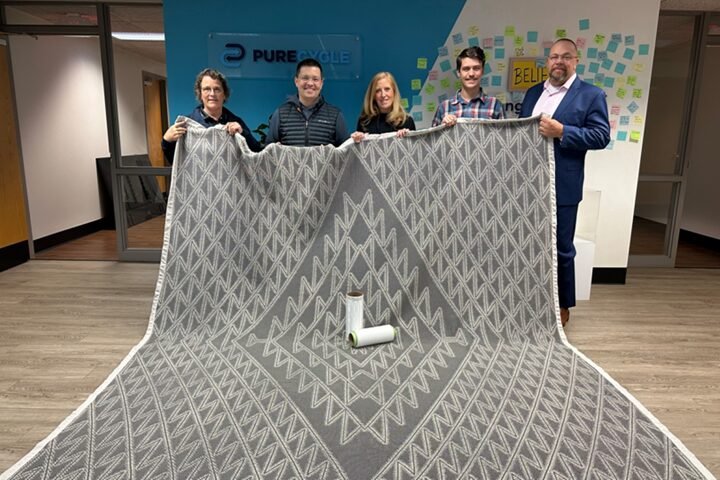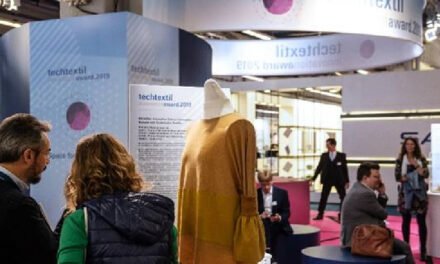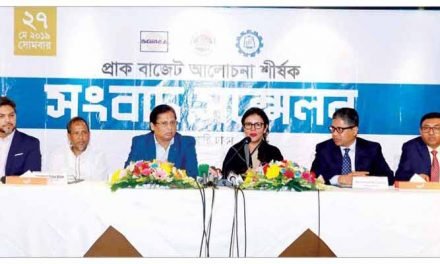 Beverley Knits has developed a collection of new knitted fabric samples made using resin produced from post-consumer recycled (PCR) waste. The company has been working with PureCycle Technologies and MiniFibers, a manufacturer of specialty fibre products in the production of several high-quality product samples.
Beverley Knits has developed a collection of new knitted fabric samples made using resin produced from post-consumer recycled (PCR) waste. The company has been working with PureCycle Technologies and MiniFibers, a manufacturer of specialty fibre products in the production of several high-quality product samples.
MiniFibers used PureCycle resin produced from post-consumer recycled (PCR) waste to create fibre packages. These packages were then sent to Beverly Knits, the U.S. circular knitter, and used to produce fabrics for a broad range of markets including home goods, automotive applications, industrial solutions, and apparel products. The initial product samples are designed to allow brand owners to feel confident that there will be no compromise in quality when they introduce PureCycle resin into their products.
Dustin Olson, PureCycle CEO explained: “MiniFibers has been a great partner as we begin our commercial journey. They’ve shown a great interest in finding ways to incorporate recycled content into their materials. “In the past, fibre producers have experienced challenges when trying to use recycled polypropylene, because the varying level of contaminants cause the thread to break during the fibre manufacturing process.” Olsen said that the company removes those contaminants in its process at the molecular level, and in doing so, provides stronger product quality.
“This trial is also a good example of PureCycle resin in a non-food grade application. Fiber represents approximately 15% of the global demand for virgin polypropylene and to date, there hasn’t been a scalable supply of recycled material to meet that demand,” he added. “I believe this is one of the many areas where PureCycle resin can serve as a tangible replacement for fossil-based polypropylene.”
PureCycle holds a global license to commercialise the only patented solvent-based purification recycling technology for restoring waste PP into ultra-pure recycled (UPR) resin, developed by Procter & Gamble.
The technology can be used for commercial production and to recycle waste such as nonwoven fabrics, contaminated food storage containers, coloured detergent bottles and automotive interior plastics – which are mostly incinerated because they are difficult to recycle – into UPR. Beverly Knits owner Ron Sytz added: “These fabrics perform exactly the same as those manufactured with virgin polypropylene fibre, making them nearly plug and play for our customers.
“We see an endless number of applications where PureCycle’s resin can be easily incorporated into the textile, transforming the fabric into a sustainable solution without any compromises. “We are excited to work with current and future customers to integrate PureCycle’s technology into cutting-edge fabrics, engineered for their specific needs.”
Polypropylene fiber is used in many industries, including apparel, textiles, and automotive. In early March, MiniFibers presented the PureCycle team with a rug made from 100% PureCycle resin that was produced from post-industrial recycled (PIR) material.
MiniFibers Sales Director John Garner, noted: “Brand owners everywhere are looking for a sustainable solution. These successful trials with PureCycle resin made from both PCR and PIR waste is a huge step forward for the industry and for sustainability. “We look forward to continuing down this path with PureCycle and our partners at Beverly Knits to start producing sustainable commercial products that can soon be used by consumers.”
PureCycle and MiniFibers plan to continue testing use cases for other nonwoven applications that could help improve the sustainability of products in the construction, automotive, and appliance industry.





















